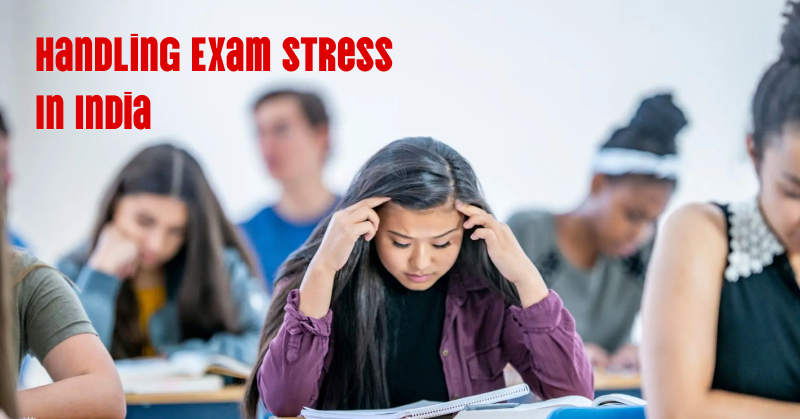In India’s intensely competitive academic landscape, students face overwhelming pressure from high-stakes exams like NEET, JEE, and CLAT, where the fear of failure and societal expectations create a mental health crisis that affects millions of young people each year. According to recent studies, around 86% of students experience high academic stress, with 87% feeling intense parental pressure, leading to anxiety, depression, and in severe cases, even suicide among those struggling to cope with the relentless demands of India’s education system.
NEET and JEE Pressure Statistics
Think of NEET and JEE preparation like training for the Olympics – millions of athletes (students) compete for just a handful of gold medals (top college seats). The numbers tell a stark story: lakhs of candidates prepare for these exams in India with extremely low success rates, creating an environment where peer pressure becomes as intense as the academic workload itself. Students find themselves constantly comparing their progress with classmates, feeling the weight of family expectations, and battling the fear that one bad day could derail years of preparation.
The psychological toll is measurable and alarming. Research shows that the pressure often stems from managing complex syllabi while competing for severely limited seats in premier institutions. The stress manifests in multiple ways:
- Peer comparison anxiety – Students constantly measure themselves against others in their coaching classes
- Performance pressure – The fear of negative marking and single-attempt consequences creates debilitating exam anxiety
- Social isolation – The intense study schedule often cuts students off from normal social interactions
- Sleep deprivation cycles – Many students sacrifice the recommended 6-7 hours of sleep for extra study time, despite expert advice against it
The statistics reveal that first-time success rates remain relatively higher than for students who take gap years, yet the mental health impact affects nearly all aspirants regardless of their eventual outcomes.
78% Students Feel Parental Pressure
The overwhelming weight of parental expectations creates a perfect storm in India’s competitive academic environment, where research reveals that a staggering 78% of students report feeling significant pressure from their families regarding academic performance. This pressure manifests in multiple forms – from psychological demands where parents constantly monitor study habits and exam results, to restrictive behaviors that limit students’ autonomy in choosing their academic paths. Parents often micromanage their children’s study schedules, compare them to high-achieving peers, and place “undue emphasis on grades and achievements,” creating an atmosphere where students feel they are “never good enough” in their parents’ eyes.
The impact extends far beyond simple motivation, as this parental pressure directly correlates with heightened academic stress levels among students. When parents set overly ambitious goals or constantly emphasize fear of failure, students develop anxiety responses that can actually hinder their performance on crucial exams like NEET and JEE.
The research shows that while some parental involvement can be motivating, the line between support and pressure is often crossed, leading to students who study primarily out of fear rather than genuine learning interest. This creates a cycle where the very pressure meant to ensure success becomes the obstacle preventing students from reaching their full potential.
Sleep Deprivation Among Exam Aspirants
Sleep becomes the first casualty when students dive into exam preparation, creating a dangerous cycle where the very thing their brains need most – quality rest – gets sacrificed for extra study hours. Medical students preparing for professional exams report significant sleep disturbances, with research showing that exam-related stress elevates cortisol levels and disrupts natural sleep-wake cycles, making it harder to fall asleep and stay asleep throughout the night. The heightened anxiety causes racing thoughts and an inability to relax, leading students to experience frequent awakenings and overall poor sleep quality during crucial exam periods.
The irony is devastating: while students believe staying awake longer gives them an academic advantage, sleep deprivation actually undermines the very cognitive functions they need most for exam success. Studies demonstrate that adequate sleep – seven to nine hours nightly – is directly linked to optimal memory consolidation, analytical thinking, and exam performance, with the hours of sleep before exams serving as a strong predictor of actual test outcomes.
Yet up to 70% of Indian students experience sleep difficulties during exam periods, creating a self-defeating pattern where exhausted minds struggle with information retention and problem-solving abilities. This sleep disruption doesn’t just affect immediate performance but can establish long-term unhealthy patterns, as students prioritize academic achievements over the fundamental biological need for restorative sleep.
Mental Health Support Systems
Think of mental health support systems like emergency exits in a building – they need to be clearly marked, easily accessible, and functional when students need them most. Unfortunately, many college students struggling with exam stress and academic pressure find these “exits” either locked, hidden, or inadequate when crisis hits.
Research reveals that students facing mental health challenges significantly underutilize available college services due to barriers like cost, stigma, or simply not knowing these resources exist. The problem becomes even more complex in India’s competitive environment, where seeking help for stress or anxiety can be seen as a sign of weakness or failure.
The most effective support systems combine multiple approaches working together like a safety net. Colleges can distribute confidential mental health assessments in classrooms to help students understand their stress levels without judgment, while implementing stress-reduction peer support groups and workshops that teach practical coping skills.
Evidence shows that interventions like cognitive-behavioral therapy, mindfulness meditation, and online coping tools significantly improve students’ ability to handle academic pressure. Additionally, telemental health resources can reduce stigma by providing anonymous access to professional help, particularly important for students who might hesitate to seek face-to-face counseling. The key is creating multiple pathways for support – from peer networks to professional counseling – so students can choose what feels most comfortable and accessible during their most vulnerable moments.
Stress Management Tips
Think of stress management like building a toolkit – you need different tools for different problems, and the more techniques you master, the better equipped you’ll be when exam pressure strikes. The key is recognizing that academic stress isn’t just about studying harder; it’s about studying smarter while protecting your mental health. Research shows that students who develop effective coping strategies not only perform better academically but also maintain their well-being throughout the challenging preparation period.
Practical stress management starts with simple but powerful techniques that can be implemented immediately:
- Time management mastery – Break massive syllabi into daily chunks rather than cramming, as poor time management is a major stress contributor
- Physical activity integration – Even 20-30 minutes of exercise daily helps combat the 90% of students who report stress from lack of physical activity
- Mindfulness and relaxation techniques – Meditation and breathing exercises help manage the anxiety that comes from constant pressure
- Realistic goal setting – Focus on personal progress rather than comparing yourself to others, which fuels unnecessary competition stress
- Regular breaks and recreation – Schedule downtime to prevent burnout, as constant studying without breaks leads to diminishing returns
- Seeking professional help – Don’t hesitate to consult counselors or therapists when stress becomes overwhelming, as resilience can be developed with proper guidance
The most successful students treat stress management as seriously as they treat their study schedule, understanding that a healthy mind performs better than an exhausted one.
Final Thoughts
The crisis of exam stress in India demands urgent, coordinated action from every level of society, as the statistics paint a clear picture: with 86% of students experiencing high academic stress and mental health challenges reaching epidemic proportions, the current system is failing our young people. Like a pressure cooker without a safety valve, India’s competitive academic environment has created unsustainable conditions where students sacrifice their well-being for academic achievement, often achieving neither. The evidence shows that stress, sleep deprivation, and parental pressure create a vicious cycle that actually undermines the very academic performance these sacrifices are meant to improve.
However, this crisis isn’t insurmountable if we treat it with the seriousness it deserves. Research demonstrates that resilience can be cultivated through practical interventions – from schools integrating mental health programs and stress management workshops to families adopting realistic expectations and open communication.
The solution requires systemic reform: policymakers must prioritize holistic evaluation methods over rote learning, institutions need accessible counseling services, and society must recognize that a student’s worth extends far beyond exam scores. By building comprehensive support systems and teaching effective stress management techniques, we can transform India’s academic landscape from a mental health crisis into an environment where students thrive both academically and personally, equipped with lifelong coping skills that serve them well beyond any single examination.







